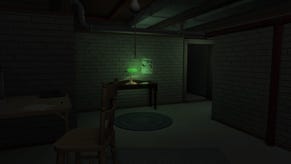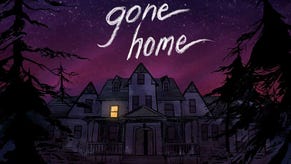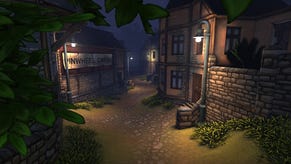Gone Home: Fullbright's masterpiece deserves a place in your house
Gone Home perfectly fuses narrative and game in a way that plays up the strengths of the medium rather than battles them. Brenna swoons over this weekend's indie darling.
At $20, Gone Home isn't going to please all of you. It's quite short, and although it contains puzzles, it's probably going to bring The Game Police out in force for not containing as much action as it does exploration. It contains quite a lot of feelings and its subject matter - the relationship between a young woman and her family members, and theirs to each other - is not exactly what marketers imagine the 18-24 male demographic is after. But it's absolutely brilliant, and I have no hesitation in saying it is one of the best games I've played this year.
Without giving too much away, the basic premise has our hero, Katie, returning home after a year spent travelling in Europe. In her absence, her family has inherited a mansion on the edge of the woods, and she arrives home, after midnight and in the middle of a storm, to a strange house which still feels not quite lived in. It's too large for the modestly comfortable family who accepted this luxurious, unexpected windfall; their furniture doesn't fill the huge spaces, their lights don't reach the distant corners, and boxes and cartons are present in nearly every room, palpable evidence of a year filled with distractions which kept them from establishing a home.
In other ways, the family are very much present. Scattered throughout the echoing, empty spaces you find small oases of comfort; a chair pulled up under a window, for example, lit by a solitary lamp, surrounded by the detritus of months of work and leisure. Investigating these spots paints a vivid picture of the three family members who occupy this house, both separately and together, and even of Katie herself.
Poking through these remnants feels exactly like being a nosy big sister. Katie rarely intrudes on the player's experience except to offer context; a gameplay prompt may offer a short explanation - "It's one of the postcards I sent" - rather than a generic "grab [X]" message. When she does, we get a picture of a well-loved, studious and athletic young woman, a protective sister who is not above poking through everything in the house on the trail of a mystery concerning her family. In this way, her personality perfectly matches with what the player is doing, which is so gosh darned rare in video games that whole books have been written about how badly everyone else does it.
Most players are likely to empathise strongly with Katie throughout the game without even noticing it's happening. Creeping around the partially-lit home while the storm rages is impressively affecting, as anybody whose even been a little creeped out in a creaky old house will recognise as they scuttle from light switch to light switch. The urge to know more about the mysteries on hand perfectly matches Katie's increasing concern for her family. What Katie wants to do and what the player wants to do are so rarely at odds that the one time she does exhibit a strong contrary preference, it comes as a shock; but it's also thought-provoking, deeply in-character, and in my case, immediately made me feel ashamed of the unchecked voyeurism I'd been exhibiting till that moment. I don't believe a game has ever made me question my own behaviour so effectively, despite all the heavy-handed cutscene hand-wringing over the murder of thousands of enemies (before going off to do it all again in the next level).
This one instance aside, I can't think of any time when I wanted to do something the game wouldn't let me do, and made room for in the story (including throw cups around the kitchen in a temper tantrum). The puzzles Katie faces are logical in a real-world sense; although the mansion she explores is large and perhaps unrealistically intricate, her quest to find the keys she needs to progress never seem ridiculous. The very first problem the player must solve is how to get in the front door, and Katie and the player solve it exactly as most of us would if we came home to an unexpectedly empty house in the era before mobile phones were common; no window smashing, no esoteric combination of items, no pixel hunting.
The greater puzzle of the game is presented by a note on the front door. Katie's teenage sister Sam is missing, leaving a confusing request not to investigate or tell her parents. As Katie explores the house in search of her family, and some answers, she is periodically rewarded with excerpts from Sam's journal, which - a very innocent spoiler - is found by the player at the end of the game.
These diary entries are narrated as the player continues their journey, and this is the only instance of us knowing more than Katie. While we hear Sam's story from start to finish, piece by piece, Katie is putting it together from tiny clues as she progresses. We have an unfair advantage, in one sense, but Katie's more intimate knowledge of her family is compensation.
Then again, as we progress, we learn things about Katie's family that it's hard to believe she ever knew, which is a heart-rending extension of the feeling of coming home all grown up to find life didn't stop without you. Sam, Terry and Janice are all hiding if not secrets then certainly very personal concerns, and each character is the centre of at least one subplot each, which the player can follow along with by careful examination of objects and documents in the environment. There's also a sort of red-herring subplot which I'm loathe to spoil, as many players are sure to believe it's the real one until the closing moments.
What's most satisfying about Gone Home is the way all these subplots tie together neatly towards the very end of the experience, which is about 90 minutes at most. The pacing is simply spot on, with mysteries building and unravelling on a perfect classical narrative arc, each contributing something to the other so that by the time Katie reaches her final destination, the pieces fall together beautifully. This kind of narrative cohesion is distressingly absent from triple-A games, where the need to deliver at least a 12 hour experience leads to bloated, rambling stories which rarely hang together, let alone satisfy.
What Gone Home does by weaving together these closely inter-related subplots with the main story isn't new; plenty of books and films have done it, and done it well. Very few games have, though, and in fact I'd say the vast majority of media of any kind fails to achieve it with such skill and panache as Fullbright brings to the table.
In Gone Home, we see an example of a story written for gaming, not just tacked onto it; we see game design in service of story, not sacrificed to it. It is a work not just of art, but of craft; if the veteran team at Fullbright could in any way be described as apprentices, this would be their masterpiece.









